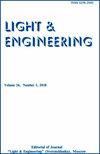Heat Transfer Model of Curtain Wall Facade Systems under Insolation
IF 0.3
4区 工程技术
Q4 ENGINEERING, ELECTRICAL & ELECTRONIC
引用次数: 0
Abstract
This paper deals with the problem of creating the basis of microclimate regulations and increasing the energy efficiency of various types of curtain walls in relation to the building thermal air envelope. The aim of the study is to distribute the heat flux flowing through the experimental envelope and determine the minimum temperature on the inner surface of the facade to develop a heat transfer model and increase the energy efficiency of curtain walls. The research methods are known scientific and technical results analytical generalization, the processes under study physical and mathematical modelling, the provisions theory of probability and mathematical statistics implementation, and fullscale experimental research. A computational model of heat transfer through curtain walls of various types is developed in relation to multiple reflections (absorption) of their surfaces in hot climatic conditions when the heat flux of beam and diffuse solar radiation passes through. Optimization of curtain wall with modern shading systems is considered. Comparison of the characteristics of similar experimental setup with traditional translucent curtain walls confirms the simulation. The proposed curtain wall with shading systems significantly improves the energy performance in the warm season compared to traditional curtain walls. A methodology based on modern computational methods that allow more accurate consideration of heat transfer through curtain walls in relation to the insolation of thermal building air envelope was developed. The methodology improves the quality of building design and microclimate and energy savings for indoor air conditioning.日照条件下幕墙幕墙系统的传热模型
本文讨论的问题是建立小气候规则的基础,并提高与建筑热风围护结构相关的各种类型幕墙的能源效率。研究的目的是分配流经实验围护结构的热流,并确定立面内表面的最低温度,以建立传热模型,提高幕墙的能源效率。研究方法有已知科学技术成果的分析概括、研究过程的物理和数学建模、概率论和数理统计理论的规定实施以及全尺寸实验研究。在高温气候条件下,当光束和漫射太阳辐射的热通量通过时,建立了不同类型幕墙传热的计算模型,并与幕墙表面的多次反射(吸收)有关。考虑了现代遮阳系统对幕墙的优化。通过与传统半透明幕墙相似实验装置的特性比较,验证了模拟结果。与传统幕墙相比,带有遮阳系统的拟议幕墙显着提高了暖季的能源性能。开发了一种基于现代计算方法的方法,该方法可以更准确地考虑通过幕墙的热量传递与热建筑空气围护结构的日照有关。该方法提高了建筑设计质量和室内空调的小气候和节能。
本文章由计算机程序翻译,如有差异,请以英文原文为准。
求助全文
约1分钟内获得全文
求助全文
来源期刊

Light & Engineering
ENGINEERING, ELECTRICAL & ELECTRONIC-OPTICS
CiteScore
1.00
自引率
50.00%
发文量
0
审稿时长
1 months
期刊介绍:
Our magazine
develops comprehensive communication within the lighting community, providing opportunities for discussion and free expression of opinions of specialists of different profiles;
contributes to the convergence of science and engineering practice, the search for opportunities for the application of research results in lighting and technological applications of light;
keeps the scientific community up to date with the latest advances in the theory of the light field, providing readers with operational professional information;
initiates international cooperation, promotes and distributes the results of Russian authors in the international professional community;
provides equal opportunities for authors from different regions of Russia and other countries.
The journal publishes articles in the following areas:
visual and non-visual effects of radiation on humans;
light field theory;
photometry and colorimetry;
sources of light;
ballasts;
light devices, their design and production technology;
lighting and irradiation installation;
light signaling;
methods of mathematical modeling of light devices and installations;
problems of energy saving in lighting, installation and operation of lighting installations;
modern production technologies of lighting products for lighting control systems;
innovative design solutions;
innovations in lighting and lighting design;
the study of the effect on plants and animals, problems of using light in medicine;
problems of disinfection of premises, water and smell elimination with the help of technology of UV radiation using;
problems of light in the ocean and space.
 求助内容:
求助内容: 应助结果提醒方式:
应助结果提醒方式:


